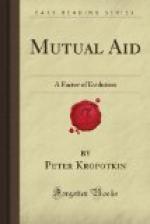Unhappily, these remarks, which might have become the basis of most fruitful researches, were overshadowed by the masses of facts gathered for the purpose of illustrating the consequences of a real competition for life. Besides, Darwin never attempted to submit to a closer investigation the relative importance of the two aspects under which the struggle for existence appears in the animal world, and he never wrote the work he proposed to write upon the natural checks to over-multiplication, although that work would have been the crucial test for appreciating the real purport of individual struggle. Nay, on the very pages just mentioned, amidst data disproving the narrow Malthusian conception of struggle, the old Malthusian leaven reappeared— namely, in Darwin’s remarks as to the alleged inconveniences of maintaining the “weak in mind and body” in our civilized societies (ch. v). As if thousands of weak-bodied and infirm poets, scientists, inventors, and reformers, together with other thousands of so-called “fools” and “weak-minded enthusiasts,” were not the most precious weapons used by humanity in its struggle for existence by intellectual and moral arms, which Darwin himself emphasized in those same chapters of Descent of Man.
It happened with Darwin’s theory as it always happens with theories having any bearing upon human relations. Instead of widening it according to his own hints, his followers narrowed it still more. And while Herbert Spencer, starting on independent but closely allied lines, attempted to widen the inquiry into that great question, “Who are the fittest?” especially in the appendix to the third edition of the Data of Ethics, the numberless followers of Darwin reduced the notion of struggle for existence to its narrowest limits. They came to conceive the animal world as a world of perpetual struggle among half-starved individuals, thirsting for one another’s blood. They made modern literature resound with the war-cry of woe to the vanquished, as if it were the last word of modern biology. They raised the “pitiless” struggle for personal advantages to the height of a biological principle which man must submit to as well, under the menace of otherwise succumbing in a world based upon mutual extermination. Leaving aside the economists who know of natural science but a few words borrowed from second-hand vulgarizers, we must recognize that even the most authorized exponents of Darwin’s views did their best to maintain those false ideas. In fact, if we take Huxley, who certainly is considered as one of the ablest exponents of the theory of evolution, were we not taught by him, in a paper on the ’Struggle for Existence and its Bearing upon Man,’ that,
“from the point of view of the moralist, the animal world is on about the same level as a gladiators’ show. The creatures are fairly well treated, and set to, fight hereby the strongest, the swiftest, and the cunningest live to fight another day. The spectator has no need to turn his thumb down, as no quarter is given.”




